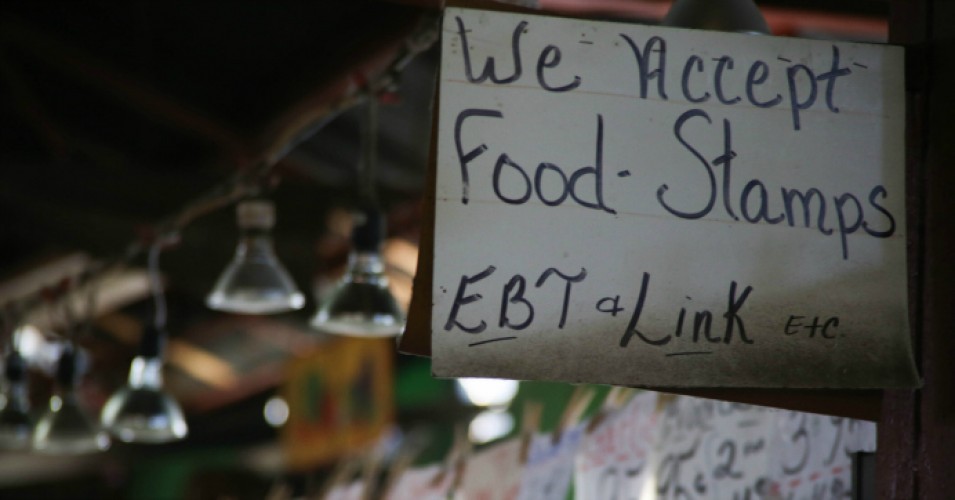“This is just another attempt by Paul Ryan to pretend that the biggest problem with the federal deficit is lazy poor people, not the $1.5 trillion tax cut he and his colleagues just gave to the richest people in the country.”
By for Common Dreams. Published 6-22-2018

A grocery store in Missouri informs customers that food stamps are accepted. (Photo: Paul Sableman/Flickr/cc)
With the Poor People’s Campaign protesting “policy violence against families and children” outside the Capitol Building, House Republicans on Thursday forced through a “shameful” and “cruel” Farm Bill that would deprive about 2 million Americans of the Supplemental Nutrition Assistance Program (SNAP), often called food stamps.
“It’s a deliberate slap in the face to the millions of low-income Americans who rely on SNAP benefits to survive,” declared Morris Pearl, chair of Patriotic Millionaires. “We don’t want to live in a country where the government allows its citizens to starve, and neither should anyone else.”
“This is just another attempt by Paul Ryan to pretend that the biggest problem with the federal deficit is lazy poor people, not the $1.5 trillion tax cut he and his colleagues just gave to the richest people in the country,” Pearl added, singling out the House Speaker who infamously revealed last year he’s been “dreaming” of slashing social safety net programs since he was “drinking at a keg” in college.
🚨BREAKING🚨: After handing the wealthy and big corporations a massive tax giveaway, the House voted to cut #SNAP benefits by $19BILLION! This will take food assistance away from 2 MILLION people. This is shameful! https://t.co/nKXkrXF5pn
— For Tax Fairness (@4TaxFairness) June 21, 2018
As Rep. Jan Schakowsky (D-Ill.) said ahead of the incredibly close vote, “Republicans are waging war on anti-poverty and anti-hunger programs.” No Democrats in the House voted in favor of the legislation.
Center on Budget and Policy Priorities president Robert Greenstein noted in a blog post that the bill “includes a sweeping proposal to impose harsh penalties on those who don’t prove within a limited time frame that they have worked or participated in work programs for enough hours each month or that they qualify for an exemption from the bill’s aggressive work requirements.”
Detailing who would feel the impacts of the new work requirements, Greenstein explained:
Among those likely to lose food assistance are a considerable number of working people—including parents and older workers—who have low-wage jobs such as home health aides or cashiers and often face fluctuating hours and bouts of temporary unemployment that could put their SNAP benefits at risk. In addition, substantial numbers of people with serious physical or mental health conditions, as well as many caregivers, may struggle either to meet the monthly work-hours requirement or to provide sufficient documentation to prove they qualify for an exemption—and, consequently, may be at risk of losing nutrition assistance.
While the requirements focus on adults, children, too, will be harmed, because when parents lose SNAP, there are fewer resources available for food for the family. Going forward with policies that reduce food assistance to poor children flies in the face of research showing that SNAP not only reduces short-term hardship but has a positive effect on children’s long-term health and educational outcomes.
The “regressive” bill also infuriated environmentalists such as Friends of the Earth’s Lisa Archer, who described it as “a massive handout to corporate agriculture” that slashes conservation programs and blocks efforts to limit the use of harmful pesticides.
“The GOP Farm Bill is a disaster for people and the planet,” Archer concluded. “Any member of Congress that voted for this bill is prioritizing the interests of corporations over the health of the American people.”
The Senate is currently working on a competing Farm Bill that not only includes funding for mental health services and research into organic agriculture, but also maintains and even strengthens the food assistance program.
“This ideological disaster of a House Farm Bill just barely passed, 213-211, on its second go-around. Compare that to the bipartisan, science-based bill now cruising toward easy passage in the Senate,” said the Union of Concerned Scientists’ Mike Lavender. “The Senate farm bill is superior on nearly every measure—from its support for farmers and our environment to its treatment of everyday people struggling to put food on the table.”
The Senate bill is expected to be voted on as early as next week.

